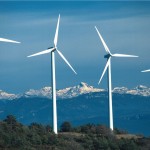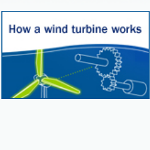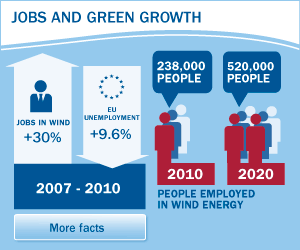 Reviewing a year’s worth of work can focus the mind on important developments. That seems especially true for wind power, which in 2010 was embraced by, among other organisations, Ikea, Google, Bacardi and the US Army.
Reviewing a year’s worth of work can focus the mind on important developments. That seems especially true for wind power, which in 2010 was embraced by, among other organisations, Ikea, Google, Bacardi and the US Army.
With those eclectic endorsements in mind, here are 10 developments from 2010 that have stuck with me:
1. Thumbs down to the US Senate for killing off a modest climate change bill due to partisanship and lobbying by narrow self-interests. Thumbs up, though, to Energy Secretary Steven Chu and Interior Secretary Ken Salazar, who are both big promoters of wind energy.
 Scotland continues promoting its very aggressive pro-wind position as a way of driving increased energy security, a green economy and mitigating climate change.
Scotland continues promoting its very aggressive pro-wind position as a way of driving increased energy security, a green economy and mitigating climate change.
The latest development occurred last week when First Minister Alex Salmond and more than 30 senior energy industry leaders met in Aberdeen to talk about the oil and gas industries and the renewable power sector collaborating to advance Scotland’s transition to a low carbon economy.
“Scotland already, per head of population, has ten-times the renewable energy of England but as the industry moves offshore we have even more potential,” Salmond told the summit Friday.
 If you’ve ever asked yourself, or want to show someone else, how a wind turbine works, check out EWEA’s easy-to-use interactive tool.
If you’ve ever asked yourself, or want to show someone else, how a wind turbine works, check out EWEA’s easy-to-use interactive tool.
It allows you to play with the three main variables that determine how much electricity a wind turbine can produce:
The wind speed: Stronger winds produce more energy. Wind turbines generate energy at wind speeds starting from 4 metres per second (a gentle breeze) up to speeds of 30 metres per second (a violent storm). Over 30 metres per second (which happens rarely), the turbine is stopped from turning.
 The growing wind power sector is expected to play a pivotal role in an ambitious plan launched Thursday by the UK government to overhaul the nation’s antiquated and overburdened electricity market.
The growing wind power sector is expected to play a pivotal role in an ambitious plan launched Thursday by the UK government to overhaul the nation’s antiquated and overburdened electricity market.
The announcement noted current arrangements have to be reformed to allow equal access to the electricity market for wind power and other renewable electricity technologies.
A government press release said the Department of Energy and Climate Change and the Treasury together have started consultations on fundamental reforms to the electricity market to ensure the UK can meet its climate goals and have a secure, affordable supply of electricity in the long term.
 There’s no shortage of developments in the US offshore wind power sector these days even though there is still not a single wind turbine generating power off the nation’s eastern coast.
There’s no shortage of developments in the US offshore wind power sector these days even though there is still not a single wind turbine generating power off the nation’s eastern coast.
Capturing most media attention last week was Deepwater Wind which announced its plans to construct the Deepwater Wind Energy Center (DWEC), the first of the ‘second generation’ of offshore wind farms in the US.
Deepwater said the new facility would have a capacity of approximately 1,000 megawatts (MW) and the ability to act as a regional offshore wind energy center serving multiple states.
 Reviewing a year’s worth of work can focus the mind on important developments. That seems especially true for wind power, which in 2010 was embraced by, among other organisations, Ikea, Google, Bacardi and the US Army.
Reviewing a year’s worth of work can focus the mind on important developments. That seems especially true for wind power, which in 2010 was embraced by, among other organisations, Ikea, Google, Bacardi and the US Army.






 Comments
Comments



